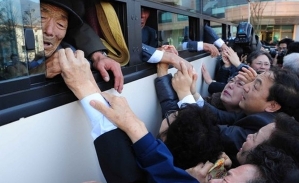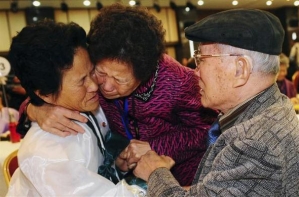North and South Korea have agreed on Wednesday to hold reunions for families that were separated by the 1950-53 Korean War, followed by Pyongyang's call to Seoul to cancel planned military drill with the United States.
The reunion meetings of around 100 chosen by lottery will be held on February 20 to 25 in Mount Kumgang, just north of the border, Seoul's Unification Ministry confirmed. If the meetings went ahead, it would the first reunions since 2010.
Last September, North withdrew the permission given notices only days in advance, South Korea says it sought reassurances in Wednesday's talks that the families' hopes wouldn't be dashed this time around.
"Our side expressed the position that what happened last year cannot be repeated," the unification ministry said, according to CNN. "The North shared the view."
Many of these families are in their 80s and 90s, so their time is running out. Since 2000, there had been only 18 reunions which allowed roughly 100 families each time to meet their lost relatives on the other side for a brief moment. Yet, more than 70,000 South Korean families kept their hopes up and seek to win the lottery.
Millions of families were divided by the Korean War, where private travels and all forms of communication, including phone calls, are banned.


According to Reuters, North Korea's offer to allow the family reunions has been welcomed by both its sole major ally, China, and the United States, who were also on the opposing side of the Korean War.
While Wednesday's agreement between the two Koreas signaled a small step forward, North may rescind permission with only days in advance notice. Furthermore, North has attacked the South on several occasion:
According to the Korean news source, Joongang Daily, there has been a historical pattern where North Korea made conciliatory gestures to the South, only to follow up with an attack.
"On Jan. 1, 2010, North Korea released a New Year's editorial calling for better inter-Korean relations. However, two months later, a South Korean naval ship was sunk, which international investigators concluded was caused by a torpedo fired by North Korea.
In October 2010, North Korea also proposed holding reunions for separated families, but in November 2010, the regime bombed South Korea's frontline island of Yeonpyeong, killing two civilians and two Marines.
On Jan. 1, 2013, North Korea's new leader Kim Jong-un also called for improving the inter-Korean relationship, but on Feb. 12, 2013, the regime carried out its third-ever nuclear weapons test."- Joongang Daily
The agreement on the reunion dates follows by a series of calls by North Korean leader Kim Jong Un's regime for better relations between the two countries, the CNN reports.
South Korean officials had said they wanted to see action rather than words from Pyongyang, including moving ahead with reunions.
Meanwhile, North Korea has not linked the reunions with its demand for the cancellation of the annual military exercised by the U.S. and South Korean militaries scheduled to begin at the end of this month.
But Seoul and Washington are clear in their intentions and will continue the drill.
"The drills have been conducted annually and they simply cannot be an issue for us as far as the reunions are concerned," said a South Korean government official involved in dealings with the North, who spoke on condition of anonymity, according to Reuters.






